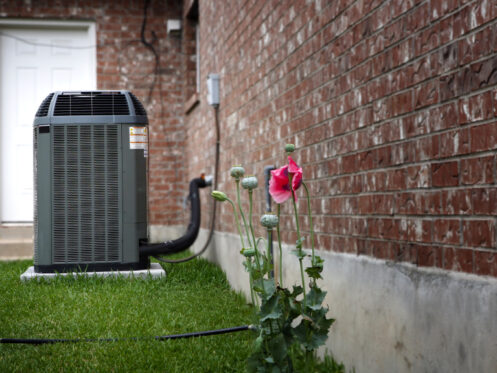The extreme heat of Nebraska summers can be downright cruel, so you need a reliable air conditioner to beat the heat. To keep your cooling system running safely and efficiently, you can perform some tasks on your own. For others, you will need to schedule routine preventative maintenance to ensure you’re ready for the dog days of summer.
Maintence Tasks Homowners Should Do
There are a couple of maintenance tasks you can perform without a professional, and they should be carried out regularly throughout the year.
Change Air Filters
The primary purpose of the air filters in your system is to keep debris out of your air conditioner so that they do not damage internal components. However, they also play a role in maintaining indoor air quality because they capture airborne pollutants that would otherwise recirculate through your living spaces.
Air filters should be replaced at least every three months. However, you may need to change them more often based on factors like the number of people in your household, whether you have pets, and whether your cooling system runs a lot during heat spells. Many homeowners inspect their filters once a month to monitor if they need attention.
Wipe Down the Oudoor Unit
The outdoor unit of your air conditioner is exposed to the elements and may get dirty. Hose off and wipe down the unit when necessary, taking care not to spray water inside it. You should also remove debris, such as leaves and twigs, away from the condenser. Finally, trim any branches or shrubs that are too close. It needs two-foot clearance on all sides to ensure optimal airflow.
Annual Maintenance By a Professional
You should have your cooling system maintained by a professional at least once a year, preferably in the spring so that your air conditioner is ready for summer. Experienced HVAC technicians know air conditioners inside and out, so performing maintenance is second nature to them. They work from a detailed checklist to ensure they look over every part of the cooling system and provide all the services required for efficient, safe, and reliable operation.
Look, Listen, Smell
The first step of the maintenance checklist involves observation. The technician will visually inspect the unit, looking for signs of damage or worn parts. Powering on the unit will help them identify strange sounds or odd smells. The air conditioner should operate quietly and with no odor. Certain sounds and smells can indicate problems within the system, and the technician can diagnose these through what they are seeing, smelling, and hearing.
Inspect Electrical Connections
Numerous wires and electrical cords power your air conditioner. They can become loose due to vibrations when the unit is running. A technician will inspect these wires, making sure they are securely connected and not damaged or frayed. Electrical components should be handled only by a trained professional to avoid the risk of injury.
Clear Condensate Drain
Your air conditioner creates condensation during operation, which then turns to water. This water must flow away from your air conditioner to prevent damage and electrical hazards. The drainage system carries this water safely away from the unit. Your technician will inspect the drain pan and condensate line and clear them of debris so that your cooling system drains properly.
Lubricate Moving Parts
Certain parts of the air conditioner move, causing friction, which could result in extra wear and tear on these components. The technician will lubricate these moving parts to ensure smooth operation.
Check Refrigerant Level
The technician will check the refrigerant in your cooling system, ensuring it is at the correct level. If the refrigerant is empty or extremely low, there is most likely a leak. The technician will check for leaks and make repairs before refilling the refrigerant. Never attempt to top off the refrigerant level on your own. Exposure to refrigerants has serious health risks, and over-filling or under-filling the refrigerant reservoir can damage your cooling system.
Inspect Belts
Your cooling unit has belts that run fans. The belts should be tight, secure, and free of cracks or tears. Your technician will inspect the belts and ensure they are in good operating condition.
Check the Blower Motor
A blower motor inside your air conditioner moves cold air into the ductwork. Your technician will visually examine the blower motor, ensuring it moves air as it should and shows no visible or audible signs of damage or failure.
Clean the Coils
Condensor and evaporator coils inside your AC collect dust and dirt and should be wiped clean. A professional uses the proper cleaning technique to avoid causing damage. Clean coils ensure your cooling system works more efficiently.
Inspect Safety Controls
HVAC systems have safety controls that prevent your unit from operating during dangerous conditions. The technician will test these safety controls, ensuring they do their job and stop your cooling system from operating under unsafe conditions. If the safety controls fail, your AC may continue to run during a malfunction, which could cause extensive damage to your unit and even cause a house fire.
Calibrate the Thermostat
If the temperature inside your home doesn’t match what the thermostat displays, your cooling system will not keep your home at the desired comfort level. During their visit, a HVAC professional can calibrate your thermostat for you.
Benefits of Air Conditioner Maintenance
Now that you know what is involved in the annual maintenance plan for your cooling unit, you should understand how these steps benefit you and your home’s comfort.
Lower Risk of Breakdowns and Failures
During the inspection of your unit, the technician looks for signs of damage, excess wear, and impending failures. By spotting these problems early, you can lower your risk of the unit breaking down unexpectedly in the middle of summer.
Lower Repair Costs
When you catch problems early, the technician can make appropriate repairs before the issue causes damage to other parts of your AC. This early intervention lowers your chance of costly repair bills or may prevent the need for repairs altogether.
Extends the Lifespan of Your AC
When your cooling system is taken care of routinely, you’ll find it operates more efficiently. More efficient operation may increase the lifespan of the unit. The more effort the AC requires to cool your home, the more it takes a toll on the individual parts of the unit.
Improves Energy Efficiency
Routine maintenance makes your AC more energy efficient by ensuring that faulty components and malfunctions are not causing your cooling system to work harder than it needs to. Peak performance translates into better energy efficiency, which lowers your utility bills.
Contact the Professionals
Keep your home cool and comfortable this summer in Lincoln or Omaha with preventative maintenance from our expert technicians at John Henry's Plumbing, Heating, Air, and Electrical. We’ll provide detailed inspection, assessment, and care for your air conditioner. In addition, our pros offer quality heating and cooling repairs and installations. We also employ a team of skilled plumbers to tackle your household plumbing needs. Contact us today to schedule an appointment with one of our experienced team members.

